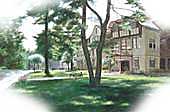Summer
1989
Blessed Barrenness
Peter Newman
"But to Hannah he gave a worthy portion; for he loved
Hannah: but the Lord had shut up her womb" I Samuel 1:5.
Have you ever cried out to the Lord because of your apparent
lack of fruitfulness? You will find comfort in the life of
Hannah. Here is not only a beautiful story of the Lord's faithfulness
to his hand maiden, but also a picture of travail in bringing
forth an anointed ministry.
Hannah was deeply loved by her husband, Elkanah. She, in
turn, wanted to bear him children, the fruit of her womb.
Isn't Hannah much like ourselves? Deeply loved and blessed
by the Lord, our desire is to please Him with a fruitful ministry.
However, in sovereign wisdom the Lord closed Hannah's womb
to accomplish His own purpose.
Hannah's situation becomes even more distressing. Her adversary,
Peninnah, bears children and unmercifully taunts Hannah for
her unfruitfulness (I Sam1:6). For years, Hannah endures her
own barrenness and Peninnah's torment, but finally her grief
becomes unbearable. "Therefore she wept, and did not
eat" I Sam 1:7b.
How many of us have had the same heart-rending experience?
In the beginning we held such hope in the Lord and expected
a fruitful ministry. But the Lord had a different plan and
shut our spiritual womb. While others seemed free to pursue
exciting activities, we travailed in learning to be still
and obey only His voice.
Others had productive ministries, yet we seemed to be doing
nothing. Of course, our adversary, the devil, regularly accused
us of being worthless because of our unfruitfulness. Like
Hannah, we prayed, cried, and misunderstood God's intention.
Faced with our barrenness, we were tempted to become discouraged
and give up, or to escape by relying on our natural strengths
and talents to produce ministry.
But God has provided a better way. "Then said Elkanah
her husband to her, Hannah, why weepest thou? and why eatest
thou not? am I not better to thee than ten sons?" I Sam
1:8. Isn't our love relationship with the Lord worth more
to us than any ministry that He may give us? Is He not better
to us than ten promises fulfilled? Isn't the joy of walking
in His presence and knowing Him intimately in this path of
obedience worth more than the joys of every promise which
will, in His timing, come to pass? Hasn't He led us past the
immediate, human joys of promises fulfilled, to the more lasting
pleasure and deeper satisfaction of His tender fellowship?
The Lord has a purpose in the closed womb. He shuts our
womb from producing ministry so He can open our capacity for
more of Himself. And so our time of barrenness becomes our
time of being set apart to the Lord that we might truly know
Him.
"And she was in bitterness of soul, and prayed unto
the Lord, and wept sore" I Sam. 1:10. When Hannah could
carry the grief of her barrenness no more, she went to the
Lord. Here is the travail of prayer born from disappointment
and broken heartedness. "I am a woman of sorrowful spirit
... (and) have poured out my soul before the Lord" I
Sam 1:15.
Like Hannah, we also can go to the Lord in our distress
and allow the Spirit of God within us to intercede in our
behalf. "Likewise the Spirit also helpeth our infirmities:
for we know not what we should pray for as we ought: but the
Spirit itself maketh intercession for us with groanings which
cannot be uttered... because he maketh intercession for the
saints according to the will of God" Rom 8:26-27. And
so our time of barrenness becomes a time of travailing prayer
unto the Lord.
"And she vowed a vow, and said, O Lord of hosts, if
thou wilt indeed look on the affliction of thine handmaid,
and remember me, and not forget thine handmaid, but will give
unto thine hand maid a man child, then I will give him unto
the Lord all the days of his life, and there shall no razor
come upon his head" I Sam 1:11. From Hannah's sorrow
springs forth a prayer of dedication, a prayer forged in the
purifying fire of God's testing. She vows that if the Lord
would give her a son, he would be wholly dedicated to the
Lord. This was just what the Lord wanted. The son conceived
from deep travail would belong to Him. For if Hannah had conceived
before the Lord had properly prepared her heart, the son would
have belonged to her. But the Lord desired a servant wholly
given unto Him, to utterly carry out only His will.
Likewise, if we were to conceive ministry through our own
natural ability, it would be our ministry and not His. We
would have been able to boast, but not before God. But the
Lord desires His ministry to be without carnal ownership.
And so our time of barrenness becomes our time of purging
and purification.
"Wherefore it came to pass, when the time was come
about after Hannah had conceived, that she bare a son, and
called his name Samuel, saying, Because I have asked him of
the Lord" I Sam 1:20. Here is Hannah with her closed
womb, barren because of God's purpose and timing. Barren because
the Lord had chosen something better for her. She was to bring
forth Samuel, a man of obedience towards God. Samuel, born
from a mother whose travail encompassed years of heartache,
from a mother whose motives were purified through years of
waiting. In her anguish she cries out to the Lord. Now is
the right time. The Lord opens her womb. The son is born.
Samuel, asked of and then given to God. Samuel, raised up
to accomplish God's purpose. "Now I will raise me up
a faithful priest, that shall do according to that which is
in mine heart and in my mind," I Sam 2:35. Samuel was
raised up during a time of spiritual barrenness. "And
the word of the Lord was precious in those days; there was
no open vision" I Sam 3:1. Samuel was raised up as a
prophet to reveal the Lord's glory. "And Samuel grew,
and the Lord was with him, and did let none of his words fall
to the ground. And all Israel from Dan to Beersheba knew that
Samuel was established to be a prophet of the Lord. And the
Lord appeared again in Shiloh: for the Lord revealed himself
to Samuel in Shiloh by the word of the Lord" I Sam 3:19-21.
And what of Hannah? Listen to her words. "My heart
rejoiceth in the Lord, mine horn is exalted in the Lord: my
mouth is enlarged over mine enemies; because I rejoice in
thy salvation. There is none holy as the Lord: for there is
none beside thee: neither is there any rock like our God"
I Sam 2:1,2. "And the Lord visited Hannah, so that she
conceived, and bare three sons and two daughters" I Sam
2:21.
Thank God for His divinely appointed barrenness. Have our
desires been purified like Hannah's? Are we ready to bring
forth a Samuel, set apart for God's purposes alone? Or will
we be like Eli and bring forth worthless, self-seeking ministry
like Hophni and Phinehas? There is a reason for the painful
waiting. There is wisdom in the barren womb.
God wants to open our womb, but only in His timing and when
we are ready to forget our own earthly needs and enter into
His purpose. The Lord will use our barrenness to bring us
into travailing prayer and holy separation. Then, at the right
time, He will raise up His "Samuel" ministry so
that His word and His glory can be revealed to a spiritually
barren world.
Until then, remain faithful! Is He not worth more to us
than ten sons?


